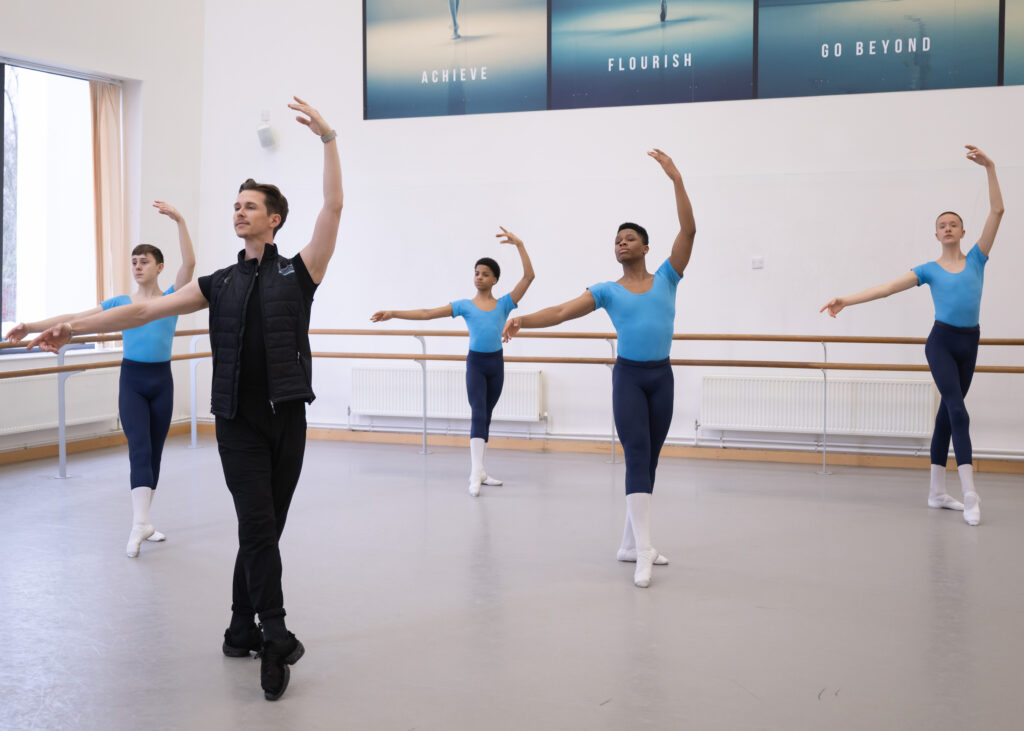You might remember Anthony Madu from a video that went viral in June 2020. Shared to millions on Instagram and X (formerly Twitter) by celebrities like Viola Davis and Cynthia Erivo, the video captured an 11-year-old Madu dancing barefoot and in the rain on a backstreet of Nigeria—and even then, the elements couldn’t dampen his lofty ballon.
Soon, millions more will get a glimpse of not just Madu’s talent but his story, which, at present, is unfolding at one of England’s most prestigious training grounds for dance: Elmhurst Ballet School.
Coming to Disney+ on March 29, Madu follows the young dancer’s journey from Lagos to Birmingham, and the highs and lows of settling into the rigorous dance classes, academics, and social life at Elmhurst. We caught up with the star of the film about moving away from his family, his career aspirations, and what he hopes other dancers take away from the documentary.
Let’s go back to when it all started: that viral video. What inspired you to film it?
I actually wasn’t the one who filmed it; my old dance teacher [Daniel Ajala] did. I wasn’t meant to be in class that day. I just took class because I was bored. My teacher decided to film it, and he posted it on Instagram and boom!
And that moment has catapulted you to a different country. What has the experience of moving and living abroad been like?
When I first moved to England, it felt amazing, but also, at the same time, it was a bit hard because of the change of weather, missing home, and the food, and that sort of thing. But I think I’ve actually gotten used to things here.
Can you talk a little bit about your early ballet training?
When I started taking ballet at [Leap of Dance Academy], I used to take class on Saturdays, just in the mornings. But as time went on, I started taking class a bit more during the week and after school. And on weekends, I would train from 8 am to around 5 pm. It was kind of hard because it’s really sunny in Nigeria, but I think it was very worth it.
Across your training in Nigeria and now in England, have you encountered negative attitudes around being a male-identifying dancer?
I don’t deal with that currently because we’ve got more male ballet dancers here than back in Nigeria, which has been really good for me. When I was in Nigeria, I kind of felt bullied for doing ballet. It wasn’t really seen as something that a guy should be doing.
For those dancers who are dealing with that same type of harm and others who are simply dreaming of pursuing careers in dance, what do you hope they take away from watching this film?
That they should never give up. They have to forget about the negativity, think more about how far they want to go, and always remember that it doesn’t really matter what people say; it just matters what you do and how you do it.

Are there any dancers who have been a source of inspiration on your ballet journey?
When I was training in Nigeria, I looked up to [American Ballet Theatre’s] Calvin Royal III. It was nice having someone you could look up to and look at them and be like, “I want to be like that someday.” But today—and I’m not saying this because he’s my current ballet teacher—I’d say [Joshua Barwick]. He is diligent, kind, and he wants to know [his students]. He talks to us.
What is next for you?
This is a hard one. The film has brought up quite a lot of thought for me. I could stay with classical ballet completely, but I’m also interested in contemporary dance. When I came to Elmhurst, where we take contemporary lessons every week, it felt like finding a new thing that you love. And I think that’s one of the best parts of life, is to realize things that you never really thought would have happened. I like contemporary because you get to do more movement than you do with ballet. You get to try loads of weird stuff. I’m also interested in moving into acting.
It seems you’ve been bitten by the cinematic bug. How was your experience filming?
The camera crew and the creative team were amazing. At first, [filming] felt a bit weird, but then I got used to it. I recently watched the film with the whole school, and I actually thought it was quite good. I cried a bit at one scene—it was when I was leaving my family in Nigeria to come to the UK. It felt like the feeling of leaving my family came back. During the end credits, there were five minutes of applause. I wasn’t expecting that many people to enjoy it as much as they did, which made me cry again. It was really exciting.


